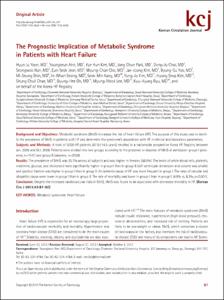KUMEL Repository
1. Journal Papers (연구논문)
1. School of Medicine (의과대학)
Dept. of Internal Medicine (내과학)
The Prognostic Implication of Metabolic Syndrome in Patients with Heart Failure
- Keimyung Author(s)
- Kim, Hyung Seop
- Department
- Dept. of Internal Medicine (내과학)
- Journal Title
- Korean Circulation Journal
- Issued Date
- 2013
- Volume
- 43
- Issue
- 2
- Keyword
- Metabolic syndrome; Heart failure
- Abstract
- Background and Objectives: Metabolic syndrome (MetS) increases the risk of heart failure (HF). The purpose of this study was to identify the prevalence of MetS in patients with HF and determine the syndrome's association with HF in clinical and laboratory parameters. Subjects and Methods: A total of 3200 HF patients (67.6±14.5 years) enrolled in a nationwide prospective Korea HF Registry between Jan. 2005 and Oct. 2009. Patients were divided into two groups according to the presence or absence of MetS at admission: group I (presence, n=1141) and group II (absence, n=2059). Results: The prevalence of MetS was 35.7% across all subjects and was higher in females (56.0%). The levels of white blood cells, platelets, creatinine, glucose, and cholesterol were significantly higher in group I than in group II. Left ventricular dimension and volume was smaller and ejection fraction was higher in group I than in group II. An ischemic cause of HF was more frequent in group I. The rates of valvular and idiopathic cause were lower in group I than in group II. The rate of mortality was lower in group I than in group II (4.9% vs. 8.3%, p<0.001). Conclusion: Despite the increased cardiovascular risks in MetS, MetS was found to be associated with decreased mortality in HF.
- Keimyung Author(s)(Kor)
- 김형섭
- Publisher
- School of Medicine
- Citation
- Seongwoo Han et al. (2013). The Prognostic Implication of Metabolic Syndrome in Patients with Heart Failure. Korean Circulation Journal, 43(2), 87–92. doi: 10.4070/kcj.2013.43.2.87
- Type
- Article
- ISSN
- 1738-5520
- Appears in Collections:
- 1. School of Medicine (의과대학) > Dept. of Internal Medicine (내과학)
- 파일 목록
-
-
Download
 oak-aaa-03307.pdf
기타 데이터 / 598.05 kB / Adobe PDF
oak-aaa-03307.pdf
기타 데이터 / 598.05 kB / Adobe PDF
-
Items in Repository are protected by copyright, with all rights reserved, unless otherwise indicated.